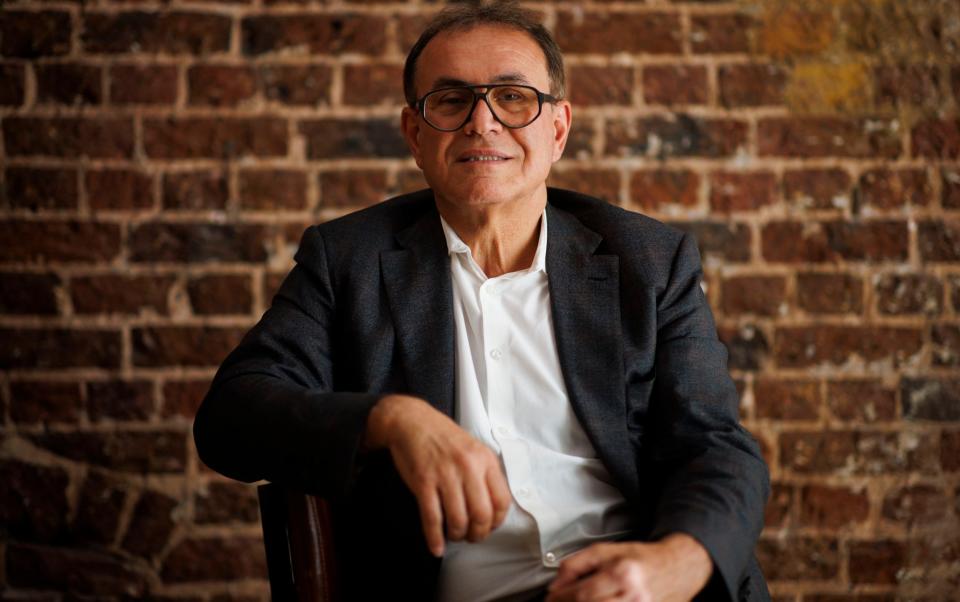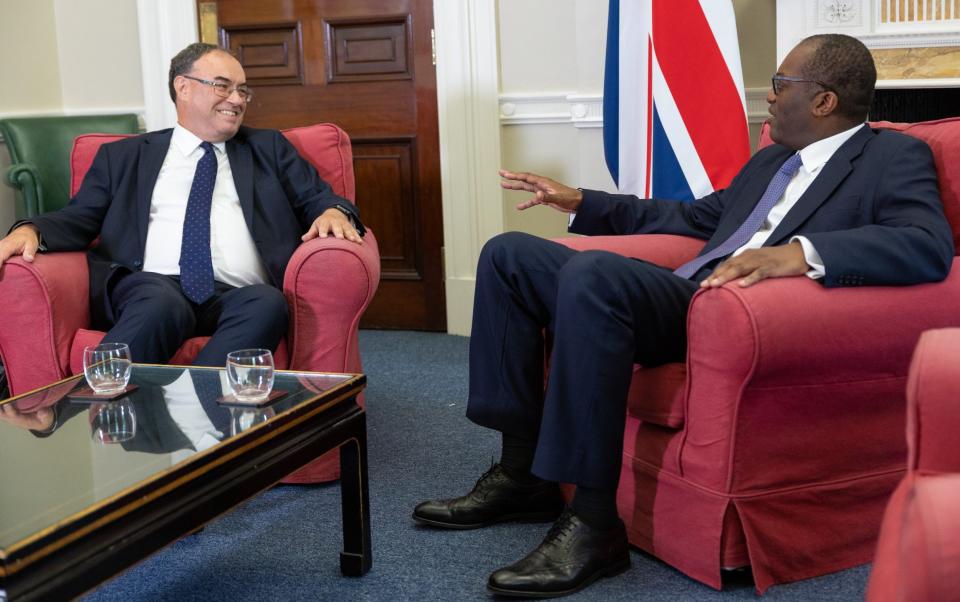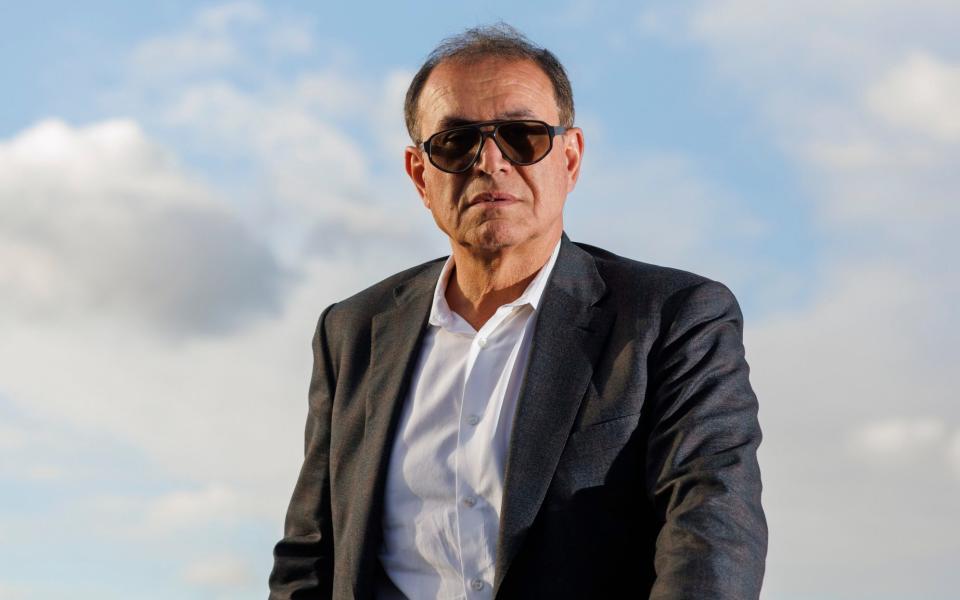The ten ‘megathreats’ facing the global economy – according to 'Dr Doom' himself

Nouriel Roubini isn't thrilled about his nickname. "I'm not Dr Doom, I'm Dr Realist", he insists.
The 64 year-old earned the moniker after correctly predicting the 2008 financial crisis. Now, Bill Clinton's former economic adviser is back with yet more dire predictions.
This time, he says, there are ten ‘megathreats’ facing the global economy including mounting debt, a demographic time bomb, the end of globalisation and the threat of artificial intelligence.
"These threats are materialising today,” he says. “I want to make people aware that if we don't address them, we're going to destroy our economy, and we're going to destroy humanity."
Roubini speaks quickly, barely taking a breath between sentences. "People want to call me Dr Doom. That's fine. But then they say: 'you're just a broken clock that is right twice a day'. I think that's untrue…It's about giving people a reality check."
Roubini, who lays out his predictions in his new book Megathreats, says the biggest danger we face today is soaring inflation. At 11.1pc in the UK, 11.3pc in Germany and 12.5pc in Italy, price rises are the highest they've been for 40 years.
The UK, he says, is suffering "the worst stagflation of all advanced economies."
"Recession is guaranteed," he says. "Even the Bank of England expects at least five quarters of contraction."
Threadneedle Street believes the coming recession will be shallower than the decline of the 1980s or in 2008, during the financial crisis, with the economy ending up around 2pc smaller as a result, compared with 6pc in the wake of the financial crash.
But Roubini claims the economic decline will be anything but short and shallow. It took the UK economy five years to get back to its pre-crisis size after the 2008 financial crisis. Almost three years after the pandemic hit, the UK is the only G7 economy yet to get back to pre-Covid levels. With recession now looming, Britain is headed towards a lost decade of growth.
Even Bank policymakers concede that prices will still be rising at an annual rate of more than 5pc until at least the end of next year. Andrew Bailey, the Bank's governor, insists there are "no ifs or buts" in getting inflation back to 2pc. Roubini describes this as "mission impossible".
While central banks may have the tools to bring inflation down, high debt levels will leave them powerless to hike interest rates without triggering a financial crisis, he says.
"Central banks are not credible when they say they're going to fight inflation at any cost,” he says. “If you want to raise interest rates enough to get inflation back to 2pc, you have to cause a recession. And for many reasons, this mantra today that there is going to be a short and shallow recession of the plain, vanilla, garden variety is nonsense. It's going to be very severe and protracted."
Keeping economies out of recession is one thing. But that's not the only problem. Roubini says there's so much debt in the world that making it harder to borrow has major consequences.
Borrowing ballooned during the pandemic as governments subsidised wages en masse during lockdown. Global debt levels currently stand at $290 trillion (£240 trillion). The Institute of International Finance says rising interest rates could trigger a "dangerous increase in debt service costs".
UK public debt has grown from 40pc of gross domestic product (GDP) in 2006 to almost 100pc today. In the US, it climbed from 65pc of GDP to 140pc of GDP. The pandemic forced many to save, but household debt also remains at elevated levels, at 133.9pc of household disposable income, official figures show. This isn't too far from the peak of 155.6pc just before Lehman Brothers collapsed.
"There is so much private and public debt in the system that if you increase interest rates to fight inflation, it not only causes a recession, but it causes a financial crash."
Roubini says higher interest rates in the UK have already caused financial tremors. The sudden jump in borrowing costs triggered by former Chancellor Kwasi Kwarteng's mini-Budget brought several pension funds to their knees, forcing the Bank of England to step in and buy government debt.
That's how doom loops form, says Roubini. Central banks will always ride in to save the day, but even they have limits. "And therefore, you have a nasty financial crash that makes the economic crash worse and so on. That's a vicious cycle."
Roubini warned in the wake of the mini-budget that the UK would end up begging the International Monetary Fund for a bail-out. He's rowed back on that prediction, but insists that the best the UK can hope for is "mediocre growth", adding that policymakers "shot themselves in the foot with Brexit".
Central banks, he says, will have to "blink and accept higher inflation", adding: "If you're not willing to raise taxes or cut spending, in order to reduce debt and deficits, the path of least resistance is having a bout of unexpected inflation because inflation reduces the real value of fixed-interest debt.”
This "inflation tax" may help to shrink Britain's debt pile relative to the size of the economy, but it also means permanently higher price rises. Roubini believes inflation rates will settle at around 5pc for the foreseeable future.
"I think 5pc to 6pc is the new normal. If inflation goes from 2pc to 6pc, gilt yields will have to be at least 8pc and mortgage rates between 10pc and 12pc."
This will inflict permanent damage to the central bank's credibility. "What have central banks become when the fig leaf of their independence has been ripped off as debts mount?”
Roubini says they have “strayed from a rigorous focus on the long-term big picture. Instead, they take cues from politicians and leveraged investors who cater to every wind of change."

While he doesn't go as far as saying that they've become too political, Roubini believes countries are addicted to cheap debt "because that is what voters want and leveraged markets need to avoid crashing".
Roubini also devotes time to talk about China, which he says had started to close itself off even before the pandemic. Friends he used to talk to freely are now cautious about what they say. Officials who used to converse in English now only speak to him via an interpreter. "China now feels much more closed. Everyone is circumspect," he says.
President Xi Jinping continues to tighten his grip on the world's second biggest economy. "China is becoming more state capitalist. It opened up for a while but under Xi Jinping, the model has been more reliant on state-owned enterprise.
"Politically it is more repressive. It was never a democracy, but people had some civil rights and they would talk to you without being scared that someone's going to arrest them. At the same time, China has high debt, demographics that are going against them and Xi's been bashing the private sector."
This puts China at a disadvantage on the world stage, but will Beijing's decision to move away from its damaging zero Covid policy make any difference? Roubini thinks it's too late.
"Productivity growth is falling, so loosening up the Covid restrictions aren't going to make much of a difference. They're stuck with growth of between 2pc and 3pc. The NYU Stern professor says this has big implications, which will leave China "stuck in a middle income trap" destined never to become the high income country it once coveted.
This could destroy an already uneasy contract between Beijing's ruling Communist Party and its citizens, he adds.
"The legitimacy of the Communist Party has always been based on the compromise of: you have no rights, there is no democracy, there are no elections, but I will give you economic opportunity and a very tangible thirty years of 10pc growth that essentially made a very poor country middle class.
"And the middle classes then hoped that China would become more like South Korea and Japan, and go from middle to high income.
“But if the economy is only growing by 2pc or 3pc, it's going to become stuck in a middle income trap. And the legitimacy of the rulers saying: 'you have no freedom, you have no democracy, you have no rights, but you have 10pc growth' is gone. And I don't know what's going to happen. But those who are weaker usually become more aggressive."
The conversation turns to technology. Roubini is far from a luddite, but he also believes a new wave of "technological unemployment" is on the way.
It was a prediction made famous by economist John Maynard Keynes, who said technological advances would bring abundance, leisure and fifteen-hour work weeks. But Keynes also warned robots would leave many more workers on the scrap heap.
Roubini believes the time is coming when companies will favour machines over people, and capital over labour. The brightest and best will continue to succeed, but the majority will be left behind.
"Work saves us from three great evils: boredom, vice, and need,” the French writer Voltaire famously observed. Addressing mass unemployment will require radical solutions. Some suggest the answer is a huge financial safety net that enables people to fund their basic needs. Universal basic income (UBI), which provides a regular, guaranteed payment to citizens, is often touted as a silver bullet. But Roubini says cash handouts will not cure boredom, or prevent vice.
"UBI may be a solution, but every human being wants the dignity of being a productive member of society. And if you're not a productive member of society, and you live and survive on welfare, eventually, you become obsolete," he says.
"Today, in the US for example there is a whole class of people who are poor, skilless, jobless, hopeless, helpless and desperate. They collect a welfare cheque already. And what do they do? They play video games. They live in virtual reality.
"Two million of them in the US are addicted to opioids, and 5pc of them die every year. They don't have friends, they live online. They're called incels because they're involuntary celibate. And they're angry towards women.
"And so these people are not going to reproduce themselves, and eventually they're going to disappear. So actually a world with UBI presents quite a dystopian future, it's actually very dark."
Despite all the gloom, Roubini describes himself as a "happy" person, though he won't go as far as saying he's an optimist.

He believes material things are unimportant. "I don't have a car. I don't have a boat. I don't have a plane. I don't have a bike". In his spare time Roubini enjoys going to museums and eating out, though he's a saver rather than a spender.
"I save a lot. I save 25pc of my income if I can because we're all going to live hopefully into our nineties. Public pensions are only going to be limited and eventually governments are going to run out of money. So if you have to retire 10, 20 or 30 years from now, you have to supplement that with savings. Unfortunately, most young people don't save at all because their incomes are so strapped that they can barely pay their bills.
“It's a real problem down the line. Social security systems are going to go bankrupt, and that's when they'll start gambling on things like meme stocks, crypto. No one has ever gotten rich by gambling."
But is there any cause for optimism on the horizon? Roubini points to the very last chapter of his book. It's a mere six-and-a-half pages in the 300 page tome, where he sets out a vision for a more "utopian future". In this future, the US and China get along, policymakers start focusing on climate change, robots are used for good and policymakers are able to unlock higher growth.
"Resourceful humans solve big problems", he says. But the solutions will require a near-miracle 5pc to 6pc rate of annual growth, which hasn't been seen in the UK since the 1980s. Roubini says accepting the inevitable means accepting there will be winners and losers, even in this new utopia.
People will be doing jobs they don't want to do, power will remain concentrated among a few big tech firms and the planet will be permanently transformed by climate change.
This, says Roubini, is as good as it's going to get.
